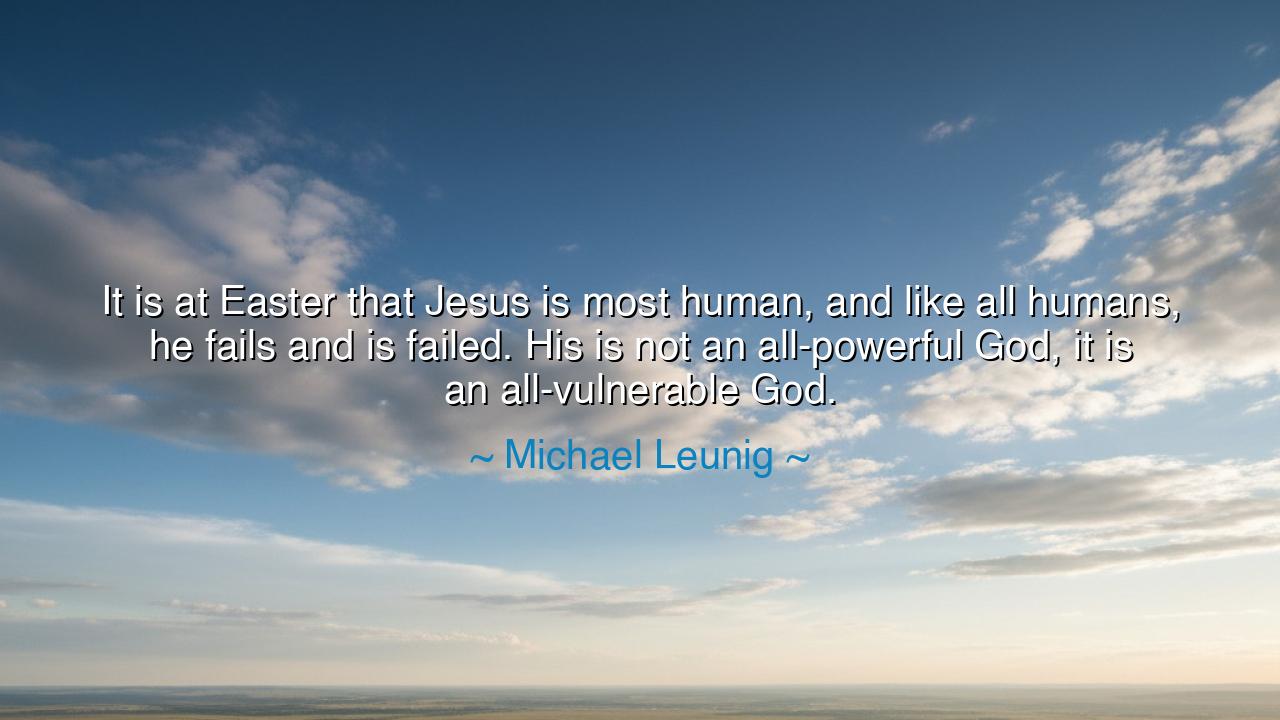
It is at Easter that Jesus is most human, and like all humans, he
It is at Easter that Jesus is most human, and like all humans, he fails and is failed. His is not an all-powerful God, it is an all-vulnerable God.






The words of Michael Leunig — “It is at Easter that Jesus is most human, and like all humans, he fails and is failed. His is not an all-powerful God, it is an all-vulnerable God” — pierce through centuries of theology and reach the trembling heart of faith itself. In these words, Leunig dares to show us the divine not upon a throne of light, but upon a cross of sorrow. He reminds us that the mystery of Easter is not only the triumph of resurrection, but also the depth of vulnerability that makes that triumph meaningful. For what greater strength can there be than a love so pure it dares to become weak, a God so infinite He chooses to suffer with His creation?
In the style of the ancients, we may say: “The immortal became mortal that the mortal might find immortality.” Leunig’s reflection draws our eyes to the part of the story we often rush past — the silence before the dawn, the failure before the glory. He speaks of Jesus as most human at Easter, for it is then that He feels the weight of fear, abandonment, and death itself. On the cross, He cries out, “My God, my God, why have You forsaken me?” — the most human of prayers, the echo of every heart that has known despair. In that cry, Leunig finds the heart of his faith: that divinity does not dwell in distance, but in shared suffering. The Easter story, stripped of grandeur, becomes an intimate tale of a God who fails with us, that we might rise with Him.
The origin of this quote lies in Leunig’s lifelong work as both artist and spiritual philosopher — a man who paints not saints in perfection but souls in their trembling honesty. His words emerge from the soil of a modern world weary of power and perfection, yearning instead for tenderness. He challenges the image of the “all-powerful God,” offering instead an all-vulnerable God, one who chooses love over control, compassion over command. This is not the God of empires, but the God of the broken-hearted — the one who kneels in Gethsemane, who bleeds for forgiveness, who loves unto death. Leunig’s theology is not rebellion, but revelation: it is the rediscovery of the sacred in human frailty.
Consider the story of Dietrich Bonhoeffer, the German pastor who opposed the tyranny of Nazi rule and paid for his defiance with his life. In prison, awaiting execution, Bonhoeffer wrote of “the suffering God,” who does not save us by escaping pain, but by entering it. “Only a suffering God can help,” he said. In his final hours, Bonhoeffer met that same vulnerable Christ whom Leunig describes — a God who does not crush evil with force, but absorbs it through love. When Bonhoeffer walked calmly to the gallows, those who saw him said his face was radiant — not because he was spared from pain, but because he had found peace in the God who shared it.
Leunig’s insight shatters the illusion that failure is the opposite of divinity. In truth, it is part of it. For in the weakness of Christ lies the revelation that to love is to risk, to hope is to expose oneself to loss. Easter, then, is not merely the victory of resurrection, but the honesty of human limitation sanctified. When Jesus falls under the weight of the cross, when His friends betray Him, when He breathes His last, He enters fully into the experience of humanity — and by doing so, He redeems it. The God who bleeds teaches us that there is holiness even in pain, beauty even in imperfection, and power even in surrender.
There is profound comfort in this truth. For every soul who has failed, for every heart that has been failed by others, Easter whispers: you are not alone. The divine has walked this road before you. The all-vulnerable God does not stand above your suffering; He kneels beside it. The cross, once a symbol of defeat, becomes the mirror of every human struggle — proof that love can survive even the world’s worst cruelty. It tells us that the path to resurrection does not bypass despair, but passes through it.
Let this be the teaching that endures: strength is born from vulnerability, and faith is not the denial of failure, but the courage to face it with love. The God of Easter is not the conqueror who crushes, but the shepherd who carries. To follow such a God is to live with open hands, to forgive when wounded, to rise when broken. As Leunig reminds us, the true miracle of Easter is not only that Christ rose, but that He dared to fall — and in His falling, revealed the heart of heaven itself.
So, remember this, O listener: when you stumble, you walk the same path the divine once trod. Do not fear your weakness; embrace it as the meeting place between man and God. For in your failures, too, dwells the seed of resurrection — proof that even in the frailest flesh, the light of eternity still burns.






AAdministratorAdministrator
Welcome, honored guests. Please leave a comment, we will respond soon